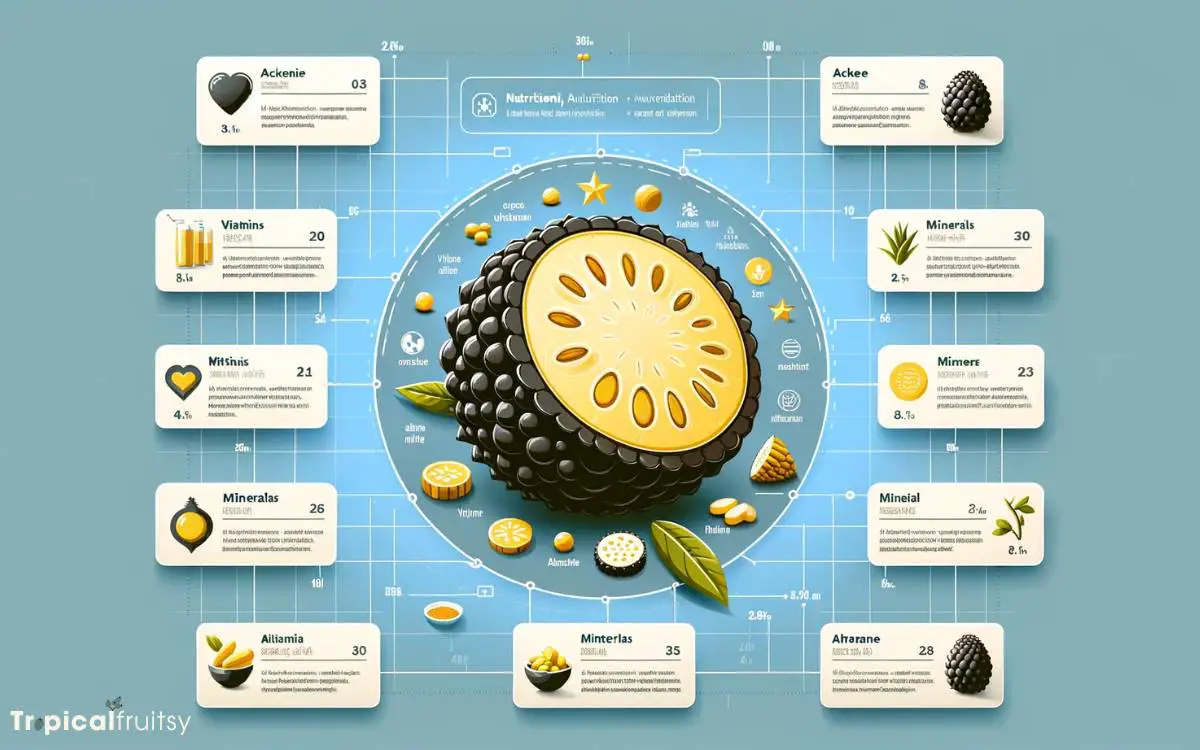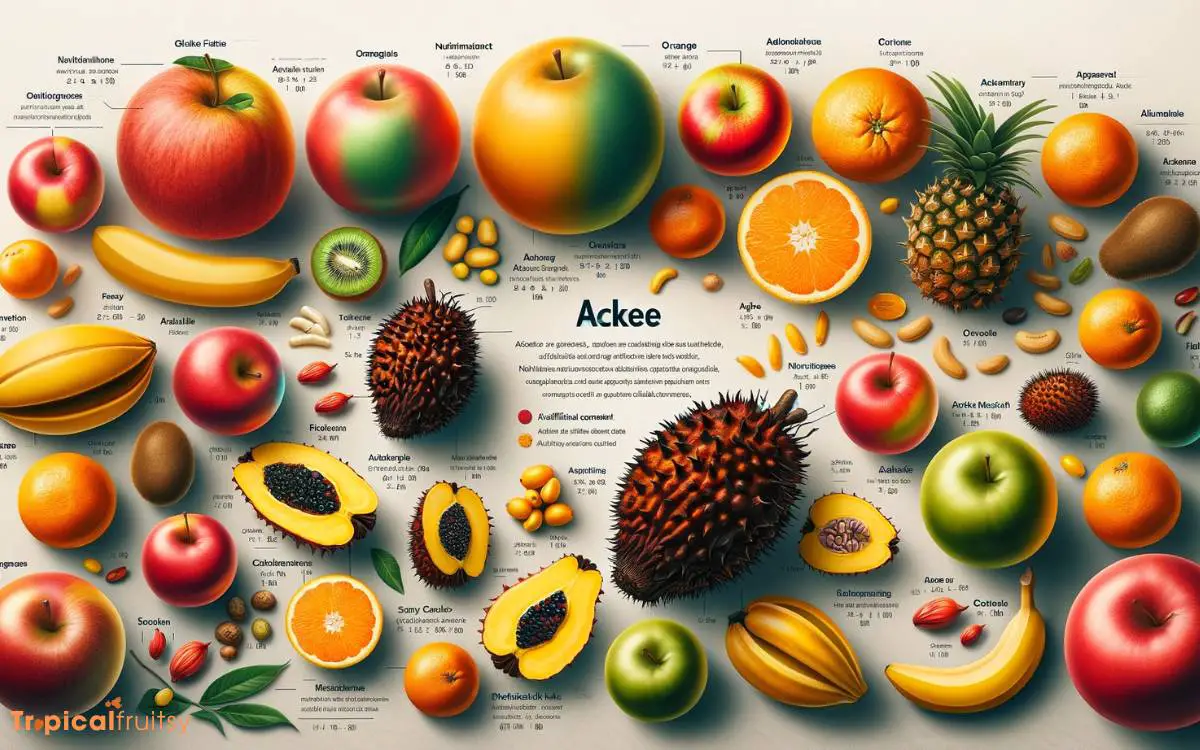Is Ackee Good for You? Unveiling the Health Benefits!
Ackee, the national fruit of Jamaica, is a rich source of essential fatty acids, dietary fiber, and vitamins C, A, and B. It contains important nutrients that promote heart health, aid digestion, and boost the immune system.
However, it must be properly prepared and eaten ripe to avoid the potentially toxic effects of hypoglycin A.
Ackee (Blighia sapida) is a tropical fruit that, when safely prepared, offers several health benefits:
However, unripe ackee fruit contains hypoglycin A, a toxin that can cause severe vomiting and can be fatal in high doses.
This condition, known as Jamaican Vomiting Sickness, is why ackee must be fully ripe and properly prepared before consumption. The fruit should open naturally, revealing its edible portions, which are then cleaned and cooked.
When ripe and properly prepared, ackee is a nutritional powerhouse, contributing to a healthy diet while infusing dishes with its unique flavor and texture.

Key Takeaway
Ackee: Nutritional Facts

The ackee fruit, native to West Africa, is rich in essential nutrients, including proteins, carbohydrates, vitamins, and minerals.
Ackee’s unique profile includes a notable amount of dietary fiber, which is beneficial for digestive health.
It is also a source of vitamin C, which plays a role in immune function, and vitamin A, important for vision and skin health.
The fruit contains several B vitamins essential for energy metabolism and the maintenance of proper brain function. Minerals such as calcium, iron, and phosphorus found in ackee contribute to bone health and the formation of red blood cells.
Its fatty acid composition, particularly the presence of unsaturated fats, makes it supportive of cardiovascular health.
This nutritional composition underscores ackee’s potential as a valuable component of a balanced diet.
Health Benefits of Ackee

Several health benefits are associated with the consumption of ackee, ranging from improved digestion to enhanced cardiovascular function.
Ackee is rich in dietary fiber, which aids in maintaining a healthy digestive system, and its high levels of unsaturated fatty acids are beneficial for heart health.
Moreover, ackee contains important vitamins and minerals that contribute to overall well-being.
| Benefit | Description |
|---|---|
| Digestive Health | High in fiber, promotes regular bowel movements. |
| Cardiovascular Support | Contains unsaturated fatty acids that help manage cholesterol. |
| Eye Health | Rich in lutein and zeaxanthin, which may protect eyesight. |
| Energy Production | Provides Vitamin B3 (niacin) that aids in energy metabolism. |
| Immune Function | Includes Vitamin C, supporting immune defense mechanisms. |
This nutritional composition underscores ackee’s potential as a beneficial addition to a balanced diet, given its multifaceted health advantages.
Risks and Precautions

Despite its numerous health advantages, there are several risks and precautions associated with consuming ackee, particularly if it is unripe or improperly prepared.
The fruit contains hypoglycin A, a toxin that can lead to a potentially fatal condition known as Jamaican vomiting sickness.
This risk is heightened when the fruit’s arils are consumed before they are fully ripe or if the inedible parts are mistakenly ingested.
Proper preparation involves waiting for the fruit to naturally open before harvesting and then discarding the toxic seeds and rind. Even when ripe, it is advised to cook ackee thoroughly to reduce any remaining toxins.
Consumers should also be aware of import regulations, as unripe ackee is banned in some countries due to its toxicity.
Ackee’s Role in Traditional Diets

Ackee holds a prominent place in the culinary heritage of various cultures, particularly within Caribbean societies where it is considered a national fruit.
The historical consumption patterns of ackee reveal its longstanding integration into traditional diets, often paired with saltfish as a source of protein.
As a nutritional staple, ackee contributes essential fatty acids, vitamins, and minerals to these diets, supporting the overall health of the populations that consume it regularly.
Cultural Significance
The fruit of the ackee tree, Blighia sapida, is deeply embedded in the culinary traditions of Jamaica, where it is the national fruit and a staple ingredient in the country’s iconic dish, ackee and saltfish.
This dish not only represents a rich culinary heritage but also underscores the importance of ackee in Jamaican culture.
The fruit’s significance extends beyond the kitchen, reflecting:
- Historical ties to West Africa, where ackee is believed to have originated.
- The impact of ackee on the Jamaican economy through both local consumption and international export.
- Social traditions, where preparing and sharing ackee dishes reinforces community bonds.
- Festive occasions, with ackee often featured during celebrations and holidays.
In a professional and informative context, ackee’s role in traditional diets is an exemplar of cultural identity and community cohesion.
Historical Consumption Patterns
Originating from West Africa, ackee has been a dietary mainstay in Jamaica since its introduction in the 18th century, reflecting its vital role in traditional consumption patterns.
Often paired with saltfish, ackee forms part of Jamaica’s national dish, evidencing its deep-rooted cultural significance.
Historically, ackee provided an accessible source of food for enslaved Africans on the island, who recognized its nutritional potential from their ancestral knowledge.
Its consumption has persisted through generations, symbolizing resilience and continuity in Jamaican cuisine.
The fruit’s preparation and integration into meals are steeped in tradition, passed down through family recipes and community practices.
Ackee continues to be a cherished ingredient, not only for its flavor but also for its nutritional value, which we will explore in the following section on its status as a nutritional traditional staple.
Nutritional Traditional Staple
As a traditional staple in Jamaican diets, ackee is renowned for its rich nutritional profile, featuring a unique combination of vitamins, minerals, and essential fatty acids.
It has been a key component of the Jamaican diet for centuries, not just for its flavor but also for its nutritional benefits.
Ackee’s consumption is deeply interwoven with cultural practices and cuisine, reflecting the importance of traditional foods in maintaining dietary diversity and nutritional health.
Key nutritional elements of ackee include:
- Vitamin C: Supports immune function and skin health.
- Folate: Essential for DNA synthesis and repair.
- Potassium: Helps regulate blood pressure and heart function.
- Monounsaturated Fatty Acids: Contributes to heart health by maintaining healthy cholesterol levels.
How to Safely Prepare Ackee

In light of its unique properties, safely preparing ackee requires strict adherence to established culinary guidelines to prevent the consumption of its naturally occurring toxins.
Unripe ackee fruit contains hypoglycin A, a toxin that can cause serious health complications, known as Jamaican Vomiting Sickness.
Therefore, it is crucial that ackee is fully ripe before consumption, which is indicated when the fruit’s protective pods turn red and naturally open on the tree.
Once the ripe fruit is harvested, the arilli (edible portions) should be carefully separated from the seeds and any remnants of the pink membrane, as these parts contain hypoglycin A. Cooking the arilli thoroughly is also essential to degrade any remaining toxins.
Consumption of canned ackee is generally considered safe, as it undergoes strict regulation and pre-processing to ensure safety.
Ackee Allergy Considerations

Ackee’s unique nutritional profile notwithstanding, individuals must consider potential allergic reactions when incorporating this fruit into their diet.
While allergies to ackee are not as common as other food allergies, they can occur and may cause adverse reactions in some individuals.
Careful consideration and consultation with a healthcare provider are advisable, especially for those with a history of food allergies.
When assessing the risk of ackee allergy, consider the following points:
- Cross-reactivity with other foods may increase the likelihood of an ackee allergy.
- Symptoms can range from mild to severe, including itching, swelling, and difficulty breathing.
- A history of latex or tropical fruit allergies could indicate a higher risk.
- Allergic reactions may also stem from improperly prepared ackee containing hypoglycin A.
Are the Health Benefits of Ackee Negated by Its High Cholesterol Content?
There are ackee cholesterol myths debunked that suggest its high cholesterol content negates its health benefits. However, ackee is packed with essential nutrients like vitamin C, potassium, and fiber which can support heart health and lower cholesterol levels. When consumed in moderation, ackee can still be part of a healthy diet.
Comparing Ackee to Other Fruits

When evaluating the nutritional profile of ackee, it is essential to consider its composition in comparison to other fruits.
Ackee’s caloric value and nutrient density may differ significantly from more common fruits, which influences its role in a balanced diet.
Additionally, ackee offers unique health benefits that may not be present in other fruits, warranting a detailed examination of its potential contributions to overall health.
Nutritional Content Comparison
Considering its unique composition, ackee’s nutritional profile stands out when compared to more common fruits such as apples, bananas, and oranges.
Ackee is particularly noted for its high content of dietary fats, which is unusual for fruits. It is also rich in certain essential nutrients.
Here is a comparative highlight:
- Ackee is a rich source of unsaturated fatty acids, unlike most fruits which are low in fat.
- It contains moderate amounts of protein, which is higher than what’s found in many other fruits.
- The fruit provides a variety of vitamins and minerals, including vitamin A, zinc, and calcium.
- Ackee has a low sugar content, which contrasts with the higher sugar levels in fruits like bananas and oranges.
Exploring these nutritional aspects, we now turn to the caloric value differences to further understand ackee’s place in a healthy diet.
Caloric Value Differences
In comparison to other popular fruits, ackee has a distinctive caloric profile, offering fewer calories per serving alongside its unique nutrient composition. This makes it an interesting option for those monitoring their caloric intake.
Here’s how ackee stacks up against other fruits:
| Fruit | Calories per 100g |
|---|---|
| Ackee | 151 |
| Banana | 89 |
| Apple | 52 |
| Mango | 60 |
However, calories are just one aspect of nutritional value, and it’s crucial to consider the overall health benefits that each fruit brings to the table.
Unique Health Benefits
Beyond its caloric content, ackee is endowed with a unique blend of vitamins, minerals, and fatty acids that confer various health benefits, distinguishing it from other fruits.
Its notable health benefits include:
- High in Essential Fatty Acids: Ackee is rich in beneficial fats, including linoleic, palmitic, and stearic acids, which are vital for heart health and maintaining cell membranes.
- Vitamin Powerhouse: It provides an excellent source of vitamin C, which is crucial for immune function, and vitamins A and B, important for maintaining good vision and energy levels.
- Mineral Rich: Ackee contains important minerals like zinc, calcium, and phosphorus, contributing to bone health and metabolic processes.
- Antioxidant Properties: The fruit has antioxidant compounds that help combat oxidative stress and may reduce the risk of chronic diseases.
These characteristics make ackee a unique and potentially beneficial addition to a balanced diet.
Conclusion
In the tapestry of dietary options, ackee emerges as a fruit of both nourishment and caution.
Laden with essential nutrients, it contributes to health when ripe and properly prepared. However, the unripe fruit harbors toxins that mandate respect and careful handling.
As a staple in cultural cuisines, ackee’s value transcends nutrition, embodying a rich heritage. Thus, ackee holds a paradoxical place on the table—offering a blend of benefits tempered by prudent use.






